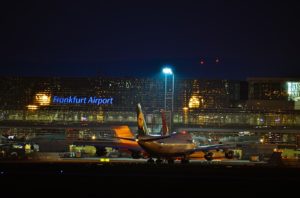
News and commentary. It’s time to get airport airspace security done. Reuters reports that flight operations at Frankfurt airport, Germany’s busiest airport, were suspended for an hour and have now resumed.
At this point there is little information available. Airport spokesmen commented to news outlets today that the airport was closed from about 7:20 am – 8:20 am local time, after a pilot reported seeing a drone. German federal police used a helicopter to search for the drone and operator. Police continue to investigate.
It’s difficult to say whether this latest issue will prove to be a “drone incident” or a case of mistaken identity, as has happened many times in the past. Previous so-called “drone sightings” have turned out to be plastic shopping bags, balloons, animals, or nothing. But with the costly and inconvenient Gatwick closures still fresh in everyone’s mind, drones near airports are bound to be a sensitive issue.
An incident like that at Gatwick, which appeared to be a well-coordinated and deliberate attack, is thankfully an extremely rare occurrence. Accidental or mistaken “drone sightings” have become, unfortunately, a common one – but an occurrence that is largely preventable.
Attempting to find a small drone and its operator from the air with a helicopter seems, at best, problematic. It’s simply the wrong tool for the job, as is an armed military response. The sophisticated airspace security solutions developed and tested within the last year, however, are not. (There are several companies offering variations on airspace security solutions at this time – we’ve reported on many of them.) Solutions that utilize a combination of sensors, AI powered recognition and sophisticated software to identify drones in the airspace before they are so close that you can see them, to differentiate the authorized from the unauthorized and then mitigate intruders appropriately, are available now. The problem is that they haven’t been implemented.
That’s not really surprising. With any huge company or government infrastructure there is a period of budgeting, testing, trial, proposal and negotiation before a major new technology can be implemented. Unfortunately, in this case the costs of delay are significant – from the 65 million dollar cost of the Gatwick incident to the untold cost to the drone industry, as regulators wait to regularize more applications until airports can be secured.
Miriam McNabb is the Editor-in-Chief of DRONELIFE and CEO of JobForDrones, a professional drone services marketplace, and a fascinated observer of the emerging drone industry and the regulatory environment for drones. Miriam has penned over 3,000 articles focused on the commercial drone space and is an international speaker and recognized figure in the industry. Miriam has a degree from the University of Chicago and over 20 years of experience in high tech sales and marketing for new technologies.
For drone industry consulting or writing, Email Miriam.
TWITTER:@spaldingbarker
Subscribe to DroneLife here.